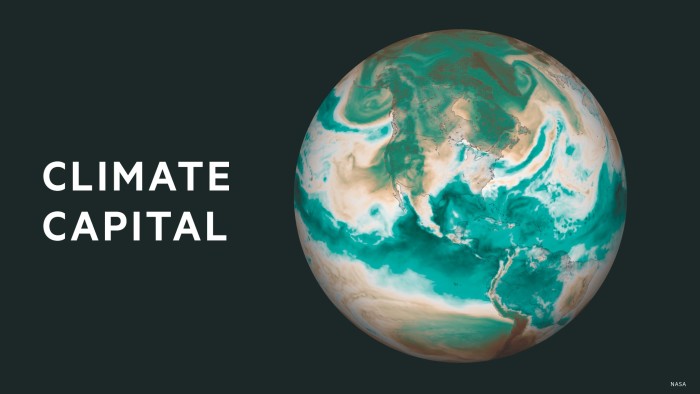A hotter world is a negative-sum game

Roula Khalaf, Editor of the FT, selects her favourite stories in this weekly newsletter.
For centuries, Britain’s status as a global hub for the wine trade belied its inability to produce its own palatable glass of red or white. Cold and damp weather made for suboptimal grape-growing conditions. But today the UK is emerging as a promising producer of sparkling wines. Vineyards are sprouting across southern shires like Sussex, and as far north as Yorkshire and Scotland. Last year, the country recorded its largest-ever grape harvest, and just this week England’s biggest winemaker, Chapel Down, said it was considering a sale of new or existing shares to fund more vineyards.
Britain’s wine industry has climate change to thank for its good fortune. Its emergence is illustrative of the strange interregnum the world is now in. Humans are feeling the effects of rising temperatures before they have managed to build resilience to them or stop the cause: greenhouse gas emissions.
As a result, extreme weather events, droughts and rising sea levels are causing enormous suffering and cost. Intense heat contributed to the deaths of at least 1,301 people during the Hajj pilgrimage this year, and more than a thousand temperature records were broken this month. In some parts of the world, a cleaner, safer energy system is taking shape, albeit far too slowly. And in others, unexpected opportunities are arising.
As tropical regions grow hotter, cooler climates are becoming milder. That is changing the distribution of economic activities. Take agriculture. Regions including South Africa and New Zealand could in the decades ahead become more suitable for coffee growing. Areas suitable for the cultivation of cashew and avocado may also expand. As seas warm, some species — from sea bass to anchovies — are moving northward, altering fish harvests.
Tourist patterns are also set to change. A 2023 European Commission analysis forecast gains in visitors to Northern Europe, particularly Scandinavia, under various temperature scenarios, as heatwaves make destinations in the Mediterranean increasingly unbearable in the summer. In a few decades, the melting of Arctic ice — if unabated — could transform global shipping routes, albeit alongside significant global environmental implications.
Business and industry are once again showing their ability to adapt to new opportunities, even if the cause is unfortunate. But here any gains are negative sum. For every new British vineyard, there are others in Chile that can no longer operate. While species may emerge in different locales, many risk dying out altogether. Once thriving Greek and Spanish holiday islands could face high unemployment. The exploitation of the Arctic may also bring pollution to another untouched corner. Above all, the impact of unrestrained temperature rises across the world is enormous. The Climate Policy Initiative recently estimated the cost of climate inaction to total up to $1,266tn by 2100.
Climate Capital

Where climate change meets business, markets and politics. Explore the FT’s coverage here.
Are you curious about the FT’s environmental sustainability commitments? Find out more about our science-based targets here
Many new economic activities will shift to the northern hemisphere — including North America, Northern Europe and Russia — at the expense of lower income countries nearer the equator. That only underscores the responsibility the wealthier “global north” has in financing worldwide efforts towards net zero goals, climate adaptation and food security. This includes support for efficient farming techniques, weather resistant crops and picking up the slack of food shortages elsewhere. And any opportunities that come their way must also be reaped sustainably.
Richer countries are not escaping the toll of climate change. They are already experiencing greater extremes in weather. Global biodiversity loss is also only expected to rise as temperatures do. That will only intensify migration pressures from the developing world, and as certain food, crops and other commodities grow scarcer, prices will rise, too. Climate change may shift the distribution of some global economic activities, but the entire world will still face the consequences.
Comments